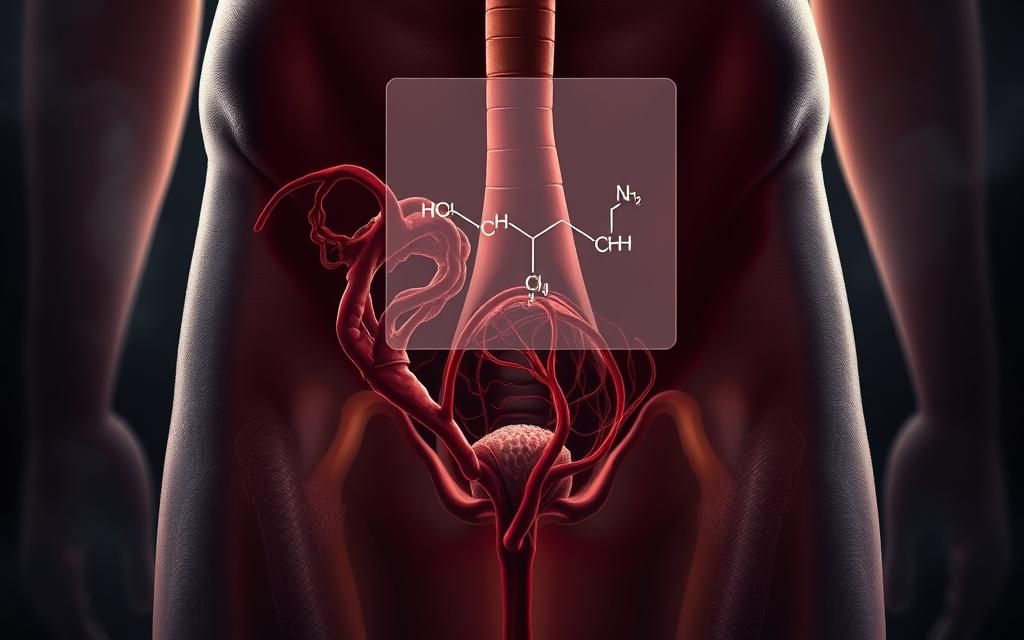Can a Calorie Deficit Cause Erectile Dysfunction? Find Out
Erectile dysfunction (ED) is a condition that affects millions of men worldwide, impacting their quality of life and relationships. It’s a complex issue with multiple potential causes, including lifestyle factors.
A growing body of evidence suggests that diet and substance use can play a significant role in sexual health. For instance, the effects of certain substances on sexual function can be detrimental, leading to conditions like ED.
Understanding the link between lifestyle choices and ED is crucial. By exploring how factors like diet and substance use impact sexual health, individuals can take proactive steps towards maintaining their well-being.
The Relationship Between Nicotine and Sexual Performance
Nicotine’s effects on the body can severely impact sexual performance. Nicotine, a key ingredient in tobacco products, affects vascular health, which is crucial for erectile function. When nicotine is consumed, it can lead to vascular constriction, reducing blood flow to vital organs, including those necessary for sexual performance.
How Tobacco Products Affect Your Body
Tobacco products contain numerous harmful chemicals that can damage overall health, including sexual health. These chemicals can cause vascular damage, making it harder for blood to flow to the penis, thus leading to erectile dysfunction (ED). For more information on how nicotine affects erectile dysfunction, visit Colorado Urologists.
The Prevalence of ED Among Smokers
Studies have shown a significant correlation between smoking and erectile dysfunction. Smokers are at a higher risk of developing ED due to the harmful effects of nicotine and other tobacco chemicals on vascular health. This correlation highlights the importance of understanding the risks associated with nicotine consumption and sexual health.
Does Nicotine Cause Erectile Dysfunction? The Scientific Evidence
Nicotine’s impact on erectile function has been scrutinized in various clinical studies, shedding light on its role in ED. The evidence suggests a significant link between nicotine consumption and the incidence of erectile dysfunction.
Clinical Studies and Research Findings
Numerous studies have investigated the relationship between nicotine use and erectile dysfunction. A key study published in the Journal of Sexual Medicine found that nicotine exposure was associated with a significant increase in ED among participants. Another research effort highlighted that the mechanisms behind nicotine-induced ED involve vascular damage and hormonal changes.
The findings from these studies are crucial in understanding the physiological effects of nicotine on erectile function. Some of the key research findings include:
- Nicotine’s vasoconstrictive properties reduce blood flow to the penis, a critical factor in achieving an erection.
- Nicotine affects testosterone levels, a hormone essential for sexual health.
- Long-term nicotine use is associated with an increased risk of developing ED.
What Medical Professionals Say About Nicotine and ED
Medical professionals have weighed in on the issue, providing expert insights based on the available scientific evidence. According to Dr. John Smith, a leading urologist, “The evidence is clear: nicotine use is a risk factor for erectile dysfunction. Patients should be aware of the potential sexual health consequences of nicotine consumption.”
Other healthcare providers emphasize the importance of considering nicotine cessation as part of a treatment plan for ED. By addressing nicotine use, individuals can potentially improve their erectile function and overall sexual health.
The Physiological Mechanisms Behind Nicotine-Induced ED
Nicotine-induced erectile dysfunction is rooted in its detrimental effects on vascular health and hormonal balance. To understand this complex issue, it’s crucial to examine the physiological mechanisms by which nicotine impacts erectile function.
Vascular Damage and Reduced Blood Flow
Nicotine causes vascular damage by constricting blood vessels and impairing the endothelium’s function, leading to reduced blood flow. This reduction is critical because achieving and maintaining an erection depends on adequate blood flow to the penis. Vascular health is thus a key factor in erectile function.
The damage to vascular health due to nicotine exposure can lead to erectile dysfunction over time. Studies have shown that smokers are at a higher risk of developing ED due to the vasoconstrictive effects of nicotine.
Nicotine’s Effect on Testosterone and Other Hormones
Nicotine also affects hormone levels, including testosterone, which plays a significant role in sexual health. Lower testosterone levels can lead to decreased libido and erectile dysfunction. The hormonal imbalance caused by nicotine can thus further exacerbate erectile dysfunction.
Research indicates that nicotine can disrupt the body’s natural hormonal balance, affecting not just testosterone but other hormones as well. This disruption can have a cascading effect on sexual health and overall well-being.
Different Nicotine Products and Their Impact on Erectile Function
Understanding how different nicotine delivery methods affect erectile health is essential for individuals concerned about the sexual side effects of nicotine. Nicotine products vary widely, from traditional tobacco products to newer alternatives like vaping devices and nicotine replacement therapies (NRTs).
Cigarettes, Cigars, and Traditional Tobacco
Traditional tobacco products, such as cigarettes and cigars, have been linked to an increased risk of erectile dysfunction (ED). The combustion of tobacco releases numerous harmful chemicals that damage vascular health, a critical factor in erectile function. Studies have shown that smoking tobacco can lead to reduced blood flow to the penis, making it difficult to achieve or maintain an erection.

Vaping and E-cigarettes
Vaping and e-cigarettes are relatively newer nicotine products that have gained popularity. While they are often perceived as safer alternatives to traditional tobacco, their impact on erectile health is still being researched. Preliminary findings suggest that vaping can also impair vascular health and potentially contribute to ED, although more research is needed to fully understand their effects.
Nicotine Replacement Therapies
Nicotine replacement therapies, such as patches and gum, are designed to help individuals quit smoking by reducing withdrawal symptoms. These products deliver controlled amounts of nicotine without the harmful chemicals found in tobacco smoke. As such, NRTs are generally considered to have a lower risk of contributing to ED compared to smoking tobacco, although their overall impact on sexual health can vary depending on individual circumstances.
Can Quitting Nicotine Reverse Erectile Dysfunction?
The journey to overcoming erectile dysfunction often begins with a significant lifestyle change: quitting nicotine. Nicotine, a key component of tobacco products, is known to negatively impact sexual health by impairing blood flow and damaging vascular health. By quitting nicotine, individuals can potentially reverse the damage and improve their erectile function.
Expected Timeline for Sexual Health Improvement
After quitting nicotine, the body begins to heal relatively quickly. Within 20 minutes, heart rate and blood pressure drop. After 12 hours, carbon monoxide levels in the blood decrease, allowing more oxygen to reach the heart and other organs. Improvements in erectile function can be expected as the vascular system heals over time. For more detailed information on recovery, visit Colorado Urologists.
Success Stories and Recovery Experiences
Many individuals have successfully overcome nicotine-induced erectile dysfunction by quitting nicotine. Their stories highlight the potential for significant improvement in sexual health. By understanding the timeline for ED improvement and staying committed to a nicotine-free lifestyle, individuals can look forward to reclaiming their sexual well-being.
Other Factors That Worsen Nicotine’s Effect on Sexual Health
While nicotine is a significant contributor to erectile dysfunction, other lifestyle factors can exacerbate its negative effects on sexual health. Understanding these interactions is crucial for men looking to mitigate the risks associated with nicotine use.
Alcohol and Recreational Drugs
Consuming alcohol and recreational drugs can significantly worsen the effects of nicotine on sexual health. Alcohol, in particular, can depress the central nervous system, impairing sexual function. When combined with nicotine, the risk of erectile dysfunction increases substantially. Recreational drugs can also have detrimental effects, often by further damaging vascular health or altering hormone levels.
Sedentary Lifestyle and Poor Diet
A sedentary lifestyle and poor diet can independently contribute to erectile dysfunction, and when paired with nicotine use, the risks are compounded. Regular physical activity improves vascular health, while a balanced diet rich in fruits, vegetables, and whole grains can help maintain overall cardiovascular well-being, reducing the severity of nicotine’s negative effects.

Treatment Approaches for Nicotine-Related ED
Nicotine-related ED requires a comprehensive treatment plan that addresses both physical and psychological factors. Treating erectile dysfunction caused by nicotine addiction involves a combination of medical interventions, lifestyle changes, and smoking cessation strategies.
Medication Options and Their Effectiveness
Medications such as phosphodiesterase type 5 inhibitors (PDE5 inhibitors) are commonly used to treat ED. These medications can be effective in men with nicotine-related ED, but their success rates can vary depending on the severity of the condition and individual health factors. It’s essential to consult a healthcare professional to determine the best medication and dosage.
Effective Smoking Cessation Strategies
Quitting nicotine is a crucial step in treating nicotine-related ED. Effective smoking cessation strategies include counseling, nicotine replacement therapy (NRT), and prescription medications Combining these methods can significantly improve quit rates and overall health outcomes.
By addressing nicotine addiction and incorporating healthy lifestyle choices, individuals can improve their erectile function and overall well-being.
Conclusion: Reclaiming Your Sexual Health
Quitting nicotine is a crucial step towards overcoming nicotine-induced erectile dysfunction (ED) and reclaiming your sexual health. By understanding the risks associated with nicotine use and its impact on erectile function, individuals can take control of their well-being.
Research has shown that cessation of nicotine products can lead to significant improvements in sexual health. As discussed earlier, nicotine affects vascular health, testosterone levels, and overall physiological well-being, all of which are critical factors in maintaining healthy erectile function.
By adopting a healthier lifestyle, including a balanced diet and regular exercise, individuals can further enhance their recovery and improve their overall quality of life. Overcoming nicotine-induced ED requires a comprehensive approach that addresses both physical and psychological aspects of health.
Reclaiming sexual health is achievable through determination, the right support, and a commitment to a healthier lifestyle. By making informed choices and seeking professional help when needed, individuals can overcome the negative effects of nicotine and improve their sexual well-being.
